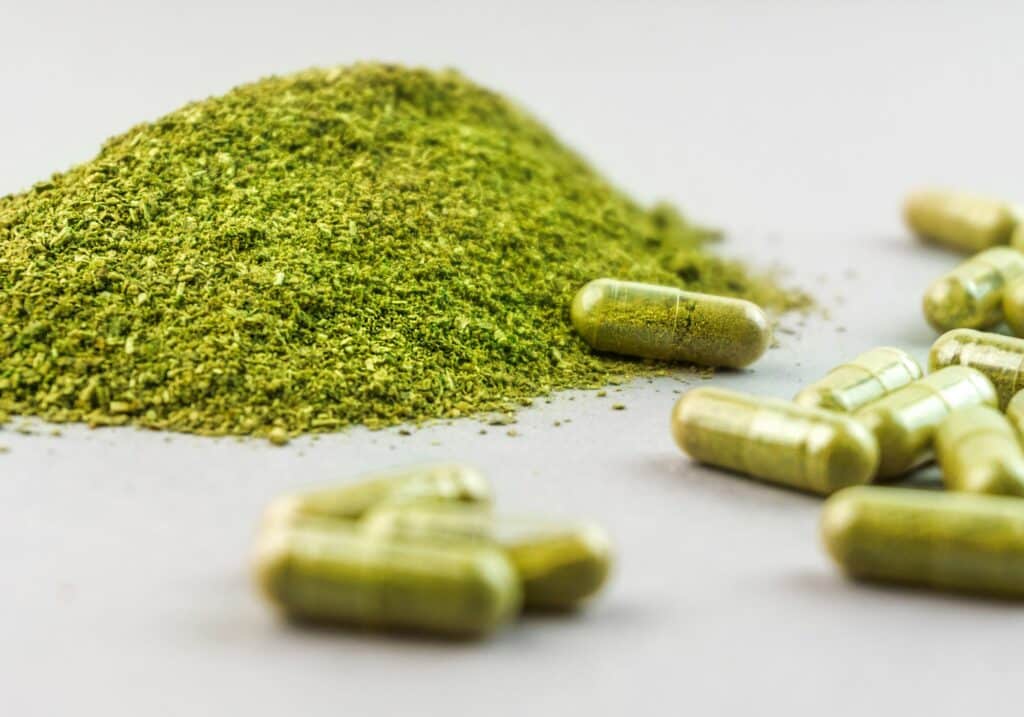Kratom addiction, while less known compared to other narcotics like cocaine, heroin, and fentanyl, is becoming increasingly prevalent, highlighting a growing need for specialized addiction treatment. At Hope Harbor Wellness we offer a dedicated rehab for kratom addiction in Atlanta, tailored to suit the needs of our clients in a secure and structured outpatient environment. If you’re struggling with an addiction to kratom, our experienced team is here to support you through this challenging health journey, helping you move towards a healthier, kratom-free life.
What is Kratom?
Kratom is an evergreen tree native to Southeast Asia, with products made from its leaves often marketed as herbal supplements. Historically used in traditional medicine as an opiate substitute, laborers and farmers consumed kratom leaves to boost energy or as an alternative to opium.
Kratom’s effects can vary depending on dosage. At low doses, it typically produces stimulant-like effects, while higher doses may induce sedative, opioid-like symptoms. In the United States, kratom has gained popularity, though it remains unapproved by the Food and Drug Administration (FDA) for any use. People often use kratom to self-manage conditions such as:
- Depression
- Anxiety
- Physical pain
- Opioid withdrawal symptoms and cravings
The psychoactive compound in kratom leaves is frequently consumed by crushing and smoking the leaves, brewing them into tea, or encapsulating them in gel capsules. Some users report reduced withdrawal symptoms and cravings, particularly in relation to opioid addiction, while others use kratom for chronic pain relief or recreational purposes. The effects of kratom typically manifest within five to ten minutes and can last two to five hours.
The Drug Enforcement Administration (DEA) has labeled kratom as a “drug of concern” in their 2017 Drugs of Abuse guide, placing it alongside substances like salvia and DXM due to its potential for adverse effects. Concurrently, the FDA advises against kratom use and has not sanctioned it for medical purposes. While kratom is not federally classified under the Controlled Substances Act, its legality varies by state. Prolonged kratom use can lead to symptoms akin to opioid use disorder, underlining the need for cautious consideration regarding its consumption.
How Addictive is Kratom?
The rise in kratom usage has brought increasing attention to its potential for addiction. Marketed as a natural herbal supplement, kratom contains compounds that activate opioid receptors in the brain, leading to effects similar to opioids. Its dual ability to stimulate and sedate makes it appealing for pain relief, energy boosts, or mood enhancement.
Kratom’s addictive nature stems from its propensity to foster tolerance and dependence with habitual use. Tolerance means users may need increasing amounts of kratom to achieve the same effects over time. Dependence develops when the body becomes accustomed to kratom, leading to withdrawal symptoms if usage decreases or stops. Properly managed medical detoxification can help mitigate kratom withdrawal.
While not everyone who uses kratom becomes addicted, certain individuals are more at risk due to factors like genetic predisposition, previous substance use, and existing mental health issues.
Effective kratom addiction treatment programs offer essential support and various therapies, helping individuals break free from kratom addiction and pursue sustained recovery. It’s important to remember that addiction is a manageable condition, and reaching out for help is a brave and important step toward a healthier, fulfilling life.
What Are the Effects of Kratom?
Kratom, while not an opiate, contains alkaloids—mitragynine and 7-hydroxymitragynine—that bind to the same brain receptors as opiates. Its effects vary based on dosage: small doses of kratom can stimulate and energize, akin to the sensation from coffee or cocaine. Larger doses, however, may induce a euphoric, calming state similar to opiates like morphine, alongside a numbing, analgesic effect.
As a psychoactive substance, kratom interacts with brain receptors. It is touted by some for mood enhancement and improved focus, but it does not significantly alter perception or cause hallucinations. The levels of psychotropic compounds in kratom are relatively low, requiring substantial ingestion to mimic the ‘high’ from other psychotropic drugs like THC.
Research suggests that kratom may be relatively safe in lower doses but potentially toxic at higher ones. Adverse reactions can occur even after a single use or sporadically. Long-term usage of kratom has been associated with various side effects, including:
Potential Short-term Effects of Kratom Abuse :
- High blood pressure
- Excessive sweating
- Nausea and vomiting
- Dry mouth
- Respiratory issues
- Confusion
- Constipation
- Paranoia
- Itching
- Tremors
- Appetite loss
- Sleep disturbances
Potential Long-term Effects of Kratom Abuse :
- Hair loss
- Weight loss
- Liver damage
- Seizures
- Hypothyroidism
- Anxiety
- Changes in skin pigmentation
Kratom can be particularly hazardous when combined with other substances, potentially due to adverse drug-herb interactions. In the U.S., kratom is not approved for therapeutic use and remains unregulated, raising concerns about product purity and the potential for harmful additives. This lack of regulation means that kratom products might contain various untested substances, emphasizing the need for caution and awareness when considering its use.

Signs and Symptoms of Kratom Addiction
Kratom addiction is increasingly recognized due to its effects on the brain’s opioid receptors, similar to drugs like heroin and prescription painkillers. Discontinuing kratom can lead to painful, sometimes dangerous withdrawal symptoms, reflecting its addictive potential. The progression of kratom addiction typically unfolds in stages:
- Trial Stage: Many stop using kratom after a few tries, especially if it’s taken for temporary symptom relief.
- Regular Use: Positive initial experiences can lead to continued use for emotional or physical discomfort.
- Increasing Risks: Users might notice dependence signs but continue due to a lack of adverse effects.
- Dependence: Withdrawal symptoms emerge upon cessation, including physical discomfort and mood swings.
- Substance Use Disorder: The final stage, marked by psychological dependence and risky behavior to maintain drug access.
Physical Symptoms of Kratom Addiction:
- Effects of kratom use appear quickly, transitioning from initial euphoria to negative impacts over time.
- Withdrawal symptoms mirror those of opioid use disorder, including shaking, sweating, and cravings.
- Continuous use to avoid withdrawal can lead to a substance use disorder, characterized by an overwhelming urge to use kratom.
Other physical signs include itchiness, muscle aches, nausea, constipation, runny nose, drowsiness, increased urination, dry mouth, rapid heartbeat, chills, and sedation. Noticeable weight loss and physical deterioration, like hair loss due to nutritional deficiency, can indicate addiction.
Psychological Symptoms of Kratom Addiction:
- Initial use may relieve depression and anxiety, but long-term addiction can worsen these conditions.
- Symptoms include insomnia, depression, anxiety, irritability, mood swings, and hostility.
- In rare cases, kratom can cause psychosis, leading to hallucinations and delusions.
Behavioral Changes of Kratom Addiction:
- Addiction can disrupt daily routines and sleep patterns, leading to lethargy, poor hygiene, and social withdrawal.
- Irritability and mood instability might cause avoidance of social interaction, deepening isolation and addiction.
Recognizing these signs and symptoms is vital for identifying kratom addiction. If you or someone you know is exhibiting these behaviors, seeking professional help is a crucial step towards recovery and regaining control. For more information or to start kratom addiction treatment, call our kratom rehab at 678-605-9725
What Causes Kratom Addiction?
Kratom addiction, like other substance use disorders, is a complex condition influenced by a mix of genetic, psychological, and environmental factors. Research indicates that certain groups may be more predisposed to developing an addiction to kratom, including:
- Individuals dealing with depression and anxiety.
- People experiencing chronic physical pain.
- Those already grappling with other addiction issues.
Frequently, individuals turn to kratom as a self-treatment method for other addictions or to ease opioid withdrawal symptoms. However, this approach can be counterproductive, potentially leading to a new dependency if kratom is used over an extended period. While the therapeutic benefits of kratom are still under investigation, the adverse effects often seem to overshadow any potential positives, contributing to its lack of approval for medical use.
Understanding the various factors that contribute to substance use disorder is crucial in addressing and managing kratom addiction effectively. Learning more about these underlying causes can offer insights into prevention and treatment strategies for those struggling with kratom dependency.

Common Kratom Withdrawal Symptoms
Physical dependency on substances like kratom can lead to noticeable withdrawal symptoms once the drug is no longer used. Common kratom withdrawal symptoms experienced by individuals discontinuing kratom include:
- Intense cravings for the substance.
- Heightened irritability.
- Increased anxiety.
- Muscle aches.
- Excessive sweating.
- Nausea.
- Aggressive behavior.
- Muscle twitching.
- Restlessness.
- Difficulty sleeping or insomnia.
- Sudden emotional outbursts.
The intensity and duration of these withdrawal symptoms largely depend on the quantity of kratom used and the duration of its use. Generally, individuals who consume kratom in large amounts over extended periods tend to experience more severe and prolonged withdrawal symptoms. However, it’s important to note that withdrawal experiences can vary greatly from person to person, with some users facing different symptoms or levels of intensity. Understanding these variations is key in preparing for and managing kratom withdrawal effectively.
Can You Overdose on Kratom?
Kratom Addiction Treatment
Treating kratom addiction calls for a holistic approach that tackles both the physical withdrawal symptoms and psychological dependencies. Given that kratom impacts the brain’s opioid receptors, its withdrawal effects often mirror those of opioids, though typically to a milder degree.
A key aspect of managing kratom addiction is the medically-assisted detoxification process. This may involve a carefully supervised tapering off of the substance or the administration of specific medications to alleviate withdrawal discomfort and promote a safer detox experience.
Behavioral therapies, particularly Cognitive Behavioral Therapy (CBT), play a critical role in treatment. They aid individuals in identifying and altering negative thought patterns and behaviors linked to kratom use, helping them develop more effective coping strategies for stress and emotional difficulties.
Participation in support groups, such as Narcotics Anonymous (NA) or kratom-specific groups, offers invaluable peer support, shared experiences, and a sense of community crucial to the recovery journey.
For those grappling with co-occurring mental health conditions alongside kratom addiction, dual diagnosis treatment is often essential. This approach ensures both the addiction and mental health issues are addressed simultaneously, paving the way for a more effective and lasting recovery.
The choice between inpatient and outpatient treatment programs depends on the severity of the addiction and the individual’s specific needs. Inpatient programs provide comprehensive, 24/7 care within a residential setting, ideal for those with severe addiction. In contrast, outpatient programs offer more flexibility, allowing individuals to undergo treatment while continuing with their daily lives at home. These programs are often complemented by therapies like yoga, mindfulness meditation, and art therapy, which contribute to overall well-being and aid in stress management.
An essential component of effective kratom addiction treatment is aftercare planning. This step involves creating a tailored plan to support individuals after they complete their formal treatment program, including ongoing therapy, relapse prevention strategies, and access to support groups.
Family therapy sessions can also play a significant role in the recovery process. These sessions help repair relationships strained by addiction and educate family members about the challenges of kratom addiction. Involving family members can create a supportive environment that fosters understanding and aids in the recovery process. For more information or to start kratom addiction treatment, call our kratom rehab at 678-605-9725.

Benefits of Seeking Treatment For Kratom Addiction
Battling drug addiction, including addiction to kratom, can be a daunting and lonely experience. However, addiction treatment centers in Atlanta offer a supportive environment with a community of counselors, physicians, and peers dedicated to helping you through your recovery journey.
Here are some key benefits of opting for kratom addiction treatment in Atlanga, Georgia:
- Structured Support: Outpatient treatment offers a well-organized and supportive framework, essential for overcoming addiction. While maintaining your daily routine, this program ensures regular interaction with medical professionals, providing essential guidance and support. The outpatient setting, although more integrated into your daily life, helps in creating an environment that minimizes triggers and distractions, focusing your attention on recovery.
- Holistic Health Improvement: Treatment centers go beyond addressing addiction alone; they focus on improving your overall physical and mental health. Substance use disorder can deplete essential nutrients and disrupt sleep, contributing to a cycle of dependence. Treatment programs provide nutritious meals to restore these nutrients, improving overall well-being. Alongside dietary improvements, physical activities and fitness classes are incorporated to build strength and establish healthy habits that extend beyond the duration of the treatment.
- Community and Supportive Relationships: Embarking on recovery is a brave step, and doing it within a community can make a significant difference. Treatment centers in Atlanta foster a sense of belonging, offering support from a compassionate team of medical professionals and the opportunity to connect with others facing similar challenges. These relationships can provide understanding, support, and hope, reinforcing the idea that recovery is achievable. The community aspect of treatment centers is invaluable, providing a network of support that continues even after the program concludes.
Overall, seeking treatment for kratom addiction in Atlanta can provide a comprehensive approach to recovery, encompassing medical supervision, mental health support, physical wellness, and community bonding. This multifaceted approach is crucial for overcoming addiction and paving the way for a healthier, substance-free future.
Kratom Addiction Treatment at Hope Harbor Wellness
Located in the serene suburbs of Atlanta, Hope Harbor Wellness is your ally in the fight against kratom addiction in Atlanta. Our kratom drug rehab centers, dedicated to holistic recovery, are ideally situated to offer you the support you need.
Our compassionate outpatient program collaborates with top-tier medical kratom detox facilities, ensuring a safe and effective detox process. Once free from addictive substances, you can seamlessly transition into one of our specialized outpatient treatment programs at Hope Harbor Wellness, designed to address substance use disorders:
- Outpatient Rehab: A flexible program tailored to fit into your daily life.
- PHP (Partial Hospitalization Program): Offers a structured yet non-residential approach to treatment.
- IOP (Intensive Outpatient Program): Provides more intensive care while allowing you to maintain daily responsibilities.
- Dual Diagnosis Treatment Program: Caters to those with co-occurring mental health disorders.
Our kratom addiction treatment programs incorporate a variety of interventions:
- MAT (Medication-Assisted Treatment): Utilizes medications to ease withdrawal symptoms and cravings.
- Psychotherapy: Addresses underlying psychological aspects of addiction.
- Group Therapy: Offers peer support and shared learning experiences.
- Individual Counseling: Provides personalized guidance and support.
- Family Therapy: Helps heal and strengthen family relationships.
- Holistic Therapies: Focuses on overall well-being, including physical, emotional, and spiritual health.
- Aftercare: Ensures ongoing support post-treatment.
Embark on your journey from addiction to recovery with Hope Harbor Wellness. Trust in our dedicated team to guide you every step of the way. For more information or to start kratom addiction treatment, call our admissions team at 678-605-9725.
Kratom Addiction Treatment Frequently Asked Questions
Why Do People Use Kratom?
Kratom is traditionally used in Southeast Asia for its stimulant and relaxing effects. In recent years, people have used kratom to self-treat withdrawal symptoms, depression, anxiety, and chronic pain, although long-term use has been linked to increased dependence and worsening symptoms.
Does Kratom Assist in Opiate Addiction Treatment?
Current research on kratom’s efficacy in treating opioid addiction is inconclusive. Long-term kratom use has shown adverse effects similar to opioid withdrawal, raising questions about its safety and effectiveness in medical applications.
Can Kratom Become Habit-Forming?
Yes, kratom can be habit-forming. Regular consumption may increase tolerance, leading individuals to consume higher doses to achieve the desired effects. This can escalate into dependence, where the body relies on kratom and experiences withdrawal symptoms in its absence.
Does Kratom Worsen Depression?
While some users report mood enhancement with kratom, others have experienced worsening depression, particularly during withdrawal or with extended, heavy use. The relationship between kratom and depression varies among individuals.
Can Kratom Cause Respiratory Issues?
There are instances of kratom users experiencing respiratory problems. However, current research on kratom’s impact on lung health is limited, and a definitive link has yet to be established.
Does Kratom Affect Thyroid Function?
There is no concrete scientific evidence directly linking kratom use to thyroid issues. However, some users have reported thyroid-related symptoms, such as metabolic changes or energy level fluctuations. More research is needed to clarify this potential connection.
Can Kratom Lead to Extreme Anxiety?
Kratom can induce extreme anxiety in certain individuals, particularly at higher doses or with prolonged use. While some use kratom for its anxiolytic properties, its effects can vary, potentially leading to heightened anxiety or panic attacks.
What Medications are Used for Kratom Withdrawal Treatment?
In kratom addiction treatment, Suboxone or Vivitrol may be administered to alleviate withdrawal symptoms. These medications, used for opioid use disorder, can ease withdrawal discomfort and reduce cravings. A medical evaluation is required to determine the appropriateness of these medications for kratom withdrawal.
How Does Kratom Impact Pregnancy?
There is limited research on kratom use during pregnancy. Concerns arise from its potential harmful effects, including respiratory suppression and risk of coma. A 2019 study indicated that infants exposed to kratom in utero may require treatment for opioid withdrawal symptoms.
Is Kratom Rehab Covered by Insurance?
Insurance coverage for kratom rehab varies by provider and plan. Many insurance companies, including private and state-funded options like Medicaid, may cover part or all of the treatment costs. It is advised to contact your insurance provider or reach out to us at 678-605-9725 to verify coverage specifics for kratom addiction treatment.









